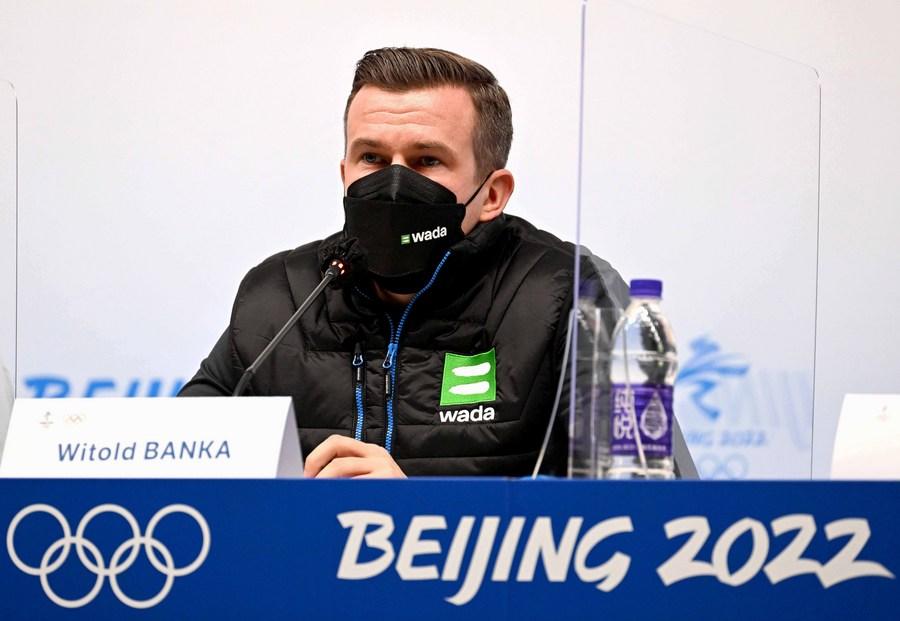
 0 Comment(s)
0 Comment(s) Print
Print E-mail China Daily, April 24, 2024
E-mail China Daily, April 24, 2024
The World Anti-Doping Agency has hit back media accusations that it helped cover up a 2021 contamination case involving Chinese swimmers, reiterating the integrity of its ruling and the innocence of Chinese athletes.
With stories developed on leaked information of the case drawing unwanted attention, WADA took to a virtual news conference on Monday to address allegations it mishandled a case involving 23 Chinese swimmers testing positive for trimetazidine (TMZ) in early 2021. Its president Witold Banka and general counsel Ross Wenzel were present at the conference, during which Banka refuted misleading reports on the incident that took place in January 2021 and was categorized as a no-fault environmental contamination following a thorough and transparent investigation.

World Anti-Doping Agency (WADA) president Witold Banka speaks during a press conference at the Main Media Center for Beijing 2022 Winter Olympics in Beijing on Feb. 2, 2022. (Xinhua/Li An)
WADA officials stressed that they found no "credible evidence" to disprove the Chinese anti-doping authorities' conclusion that all the swimmers testing positive for an "extremely low concentration" of TMZ had ingested the banned substance unwittingly after inadvertently being exposed to it at a hotel during a national meet almost half a year before the Tokyo Olympics.
Banka claimed that, at every stage, WADA followed all due process and diligently investigated every lead and line of enquiry in this matter.
"If we had to do it over again, we would do exactly the same thing," Banka said during the online conference on Monday night, which lasted nearly two hours.
After running its own investigation and following scientific reviews supported by external consultation, WADA concluded that no athletes should be held accountable for any violation or negligence in the case.
"We carefully reviewed the decision of China Anti-Doping Agency (CHINADA) from every perspective. We examined every piece of evidence and gathered further information as appropriate," Banka said.
"As a part of this review, we collected additional unpublished scientific information on the substance in question and consulted independent scientific experts to test the contamination theory. No credible evidence of wrongdoing was provided by any source who came forward."
Agreed on, and supported by, World Aquatics, the sport's governing body, WADA cleared all swimmers involved for training and competition in 2021, and had kept the probe confidential in order to protect the athletes.
However, New York Times reported it on Saturday after somehow obtaining information that was supposed to remain undisclosed.
WADA also fired back criticism from Travis Tygart, CEO of the US Anti-Doping Agency, who, without any concrete evidence, labeled WADA's investigation and its subsequent conclusion as a "potential cover-up", stirring up unnecessary and misplaced hostility among athletes against their Chinese counterparts.
Banka questioned Tygart's motives for his heated reaction.
"I have to say that, from our perspective, look (ing) at the comments on social media and the official statements from USADA, it is obvious that most of the comments are politically motivated, and made without any evidence that there was something wrong on our side," said Poland's former sports minister.
Wenzel, addressing the question why the rest of the swimming world was not informed about the case, added that it was handled accordingly, and in a similar manner to previous incidents, pointing out that USADA appears to have displayed double standards regarding doping investigations where no fault was found.
Wenzel, a lawyer and sports legal expert, stressed that this case is not without precedent, citing an equivalent event in 2014 involving more than 10 American athletes, in which WADA accepted a similar finding of no-fault contamination by USADA and charged no violations.
"There are many other examples where there has been group contamination related to food or environment, and these cases have been closed without public disclosure because it has been accepted that the athletes were found to not be at fault," he said.
"USADA, for instance, is one of the organizations that has been quite vocal that cases of no fault should not be subject to public disclosure," Wenzel added.
The timing of the information leak and subsequent media speculation could almost be considered cynical, coming just three months out from the opening of the 2024 Paris Olympics and just as most of China's elite swimmers are fully focused on the domestic Olympic trials, which are taking place this week in Shenzhen, Guangdong province.
WADA's vice president Yang Yang, a former Chinese Winter Olympic champion skater, has called for equal efforts in protecting the reputations of innocent athletes, as well as fighting the sport's real drug-cheats.
"Anti-doping work largely relies on science. Simultaneously, due to the complex external environment, such as improper policies, crimes and political interventions, etc., we must possess an efficient and transparent management system that is able to withstand these tests and guarantee the implementation of our work," she told Xinhua.
"We have to enable athletes to have confidence in the system, as well as avoid innocent athletes being hurt. We have been working on this for years, especially through recent governance reform, and we are confident in facing these challenges now."
Following the misleading media reports, both WADA and CHINADA insisted that they have reserved the right to take legal action if necessary against "potentially defamatory" reports and comments, according to earlier statements released by the two agencies.